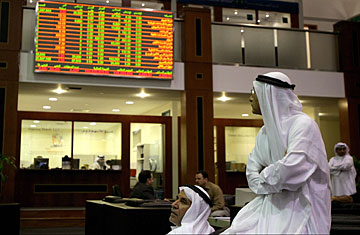
Investors follow the stock market activity on a monitor at the Dubai Financial Market.
(2 of 2)
Wary sovereign wealth funds from Arab countries aren't likely to rush in to buy the assets of Western financial companies just yet, according to Sfakianakis. Some have already been burned, like the Kuwait Investment Authority, which bought Merrill Lynch shares worth billions earlier this year only to see the stock plummet in recent months. So for now, Arab investors are likely to refocus on infrastructure projects in their own countries that create real value and services for their economies, which are bound to keep growing even in the midst of a Western financial crisis.
For his part, real estate developer Khan still has faith in the seemingly inexhaustible ability of Dubai developers to wow the world. "Who ever thought you could build a palm island?" he says. "You can never imagine the things they'll come up with next." In fact, if prices come down a little more, he's thinking of buying a few properties of his own, perhaps a villa for when he grows older and starts a family. "My grandfather had a saying: Land will never let you down." That's a maxim that could be severely tested — even in Dubai.
